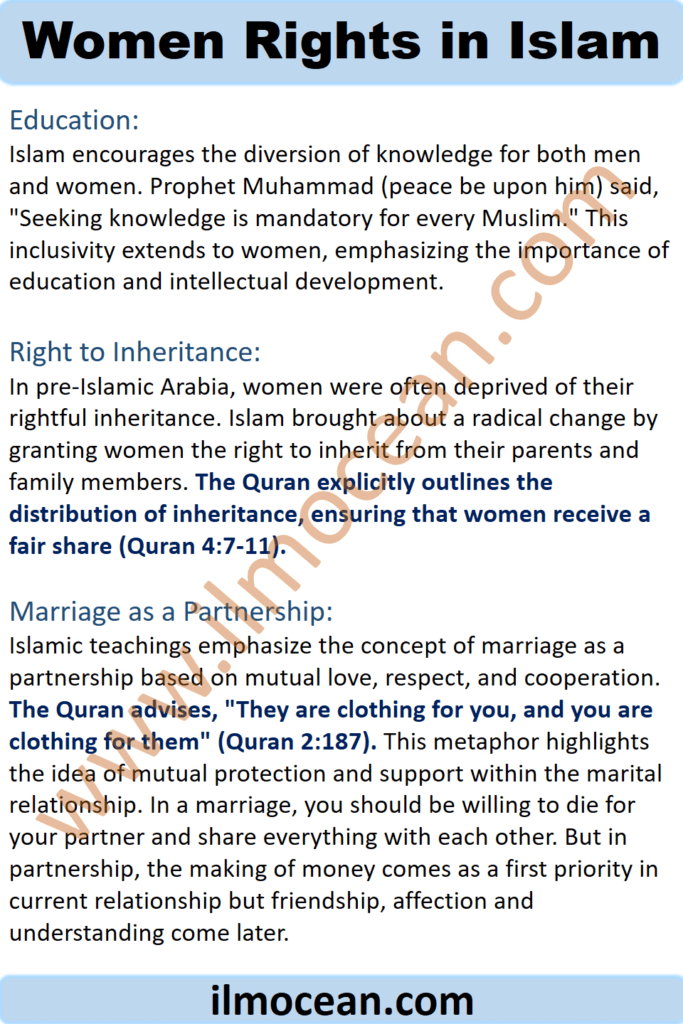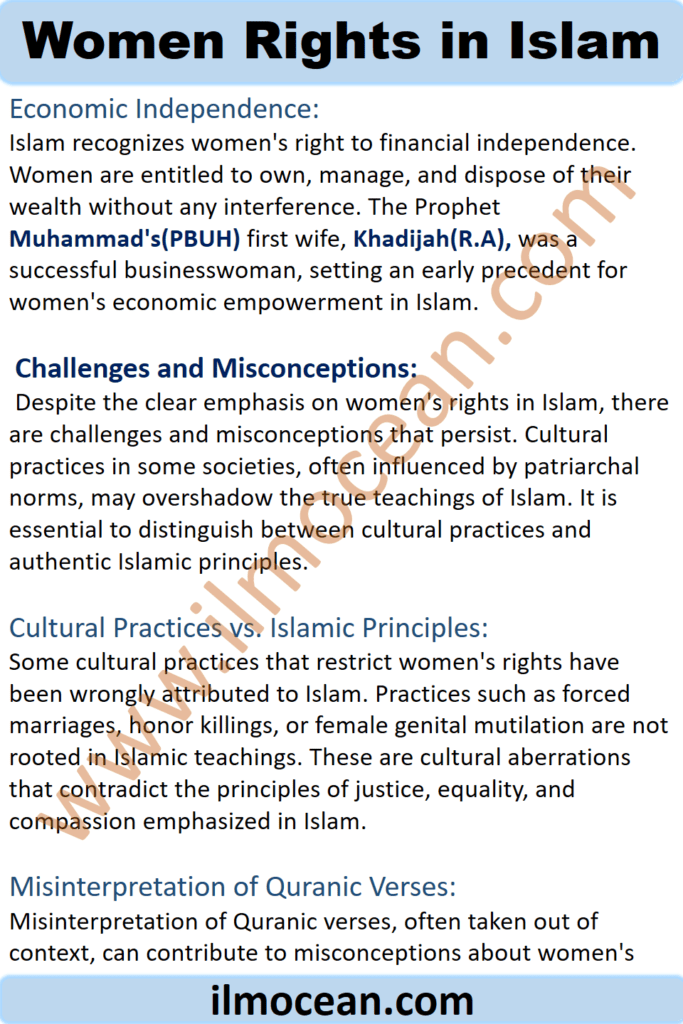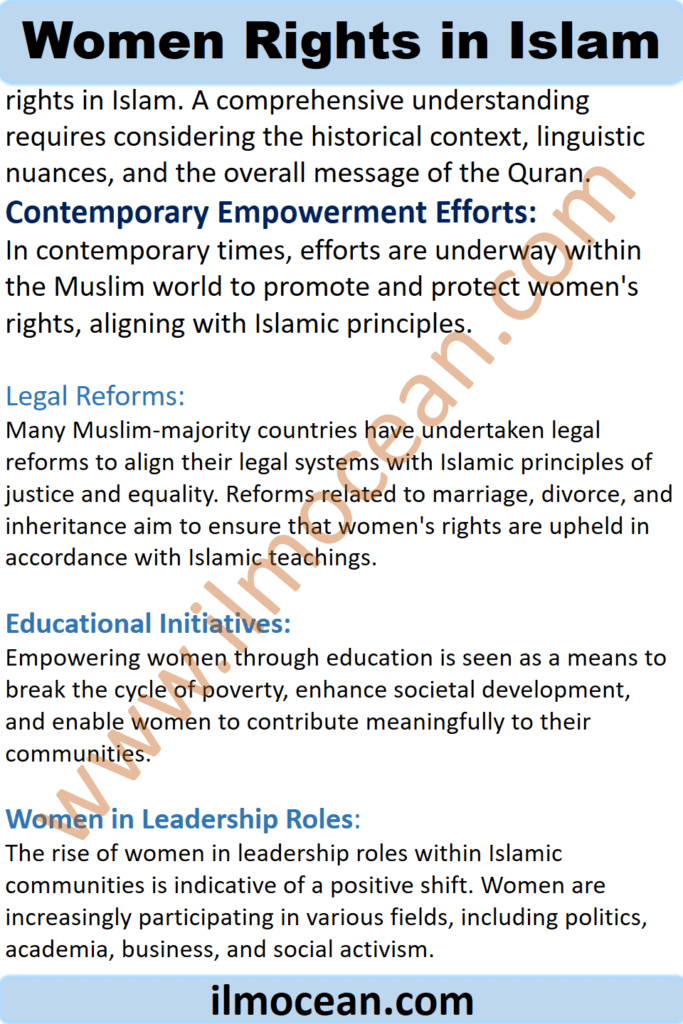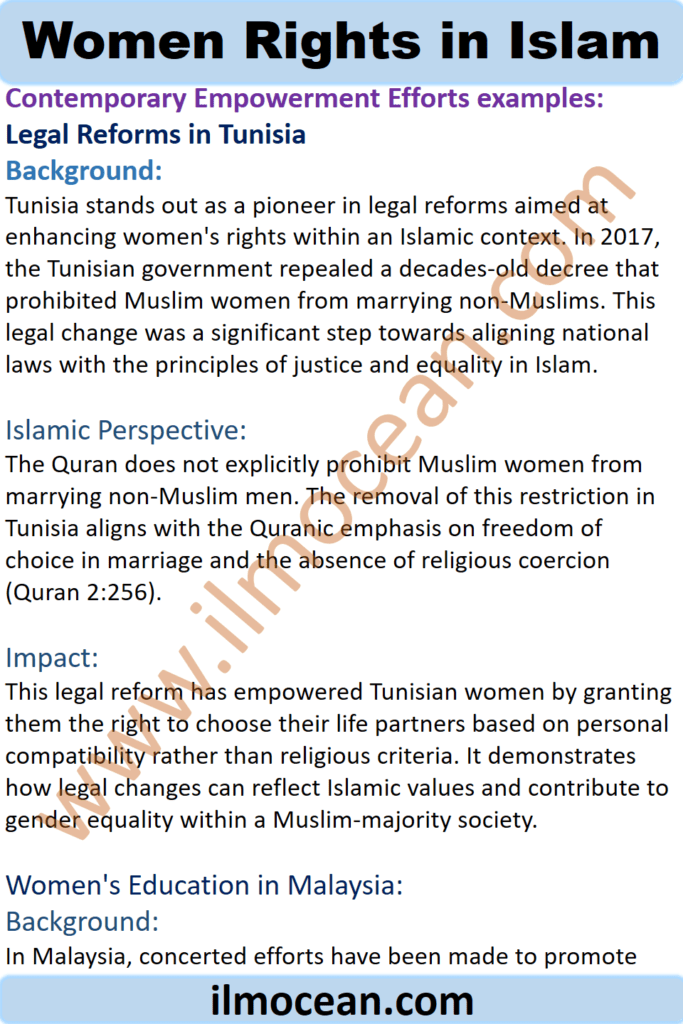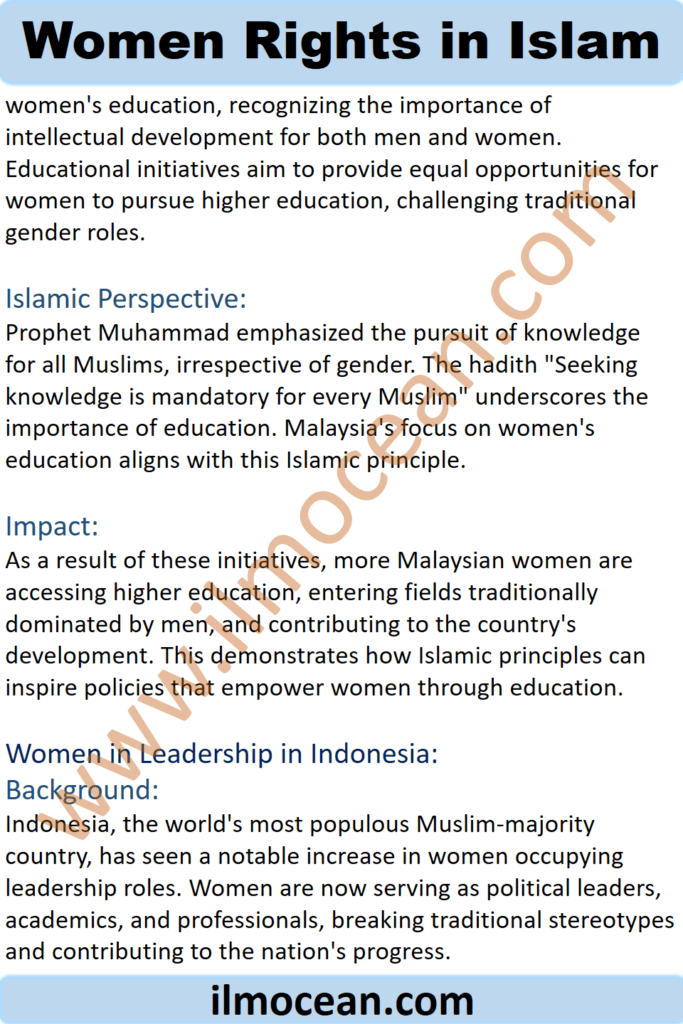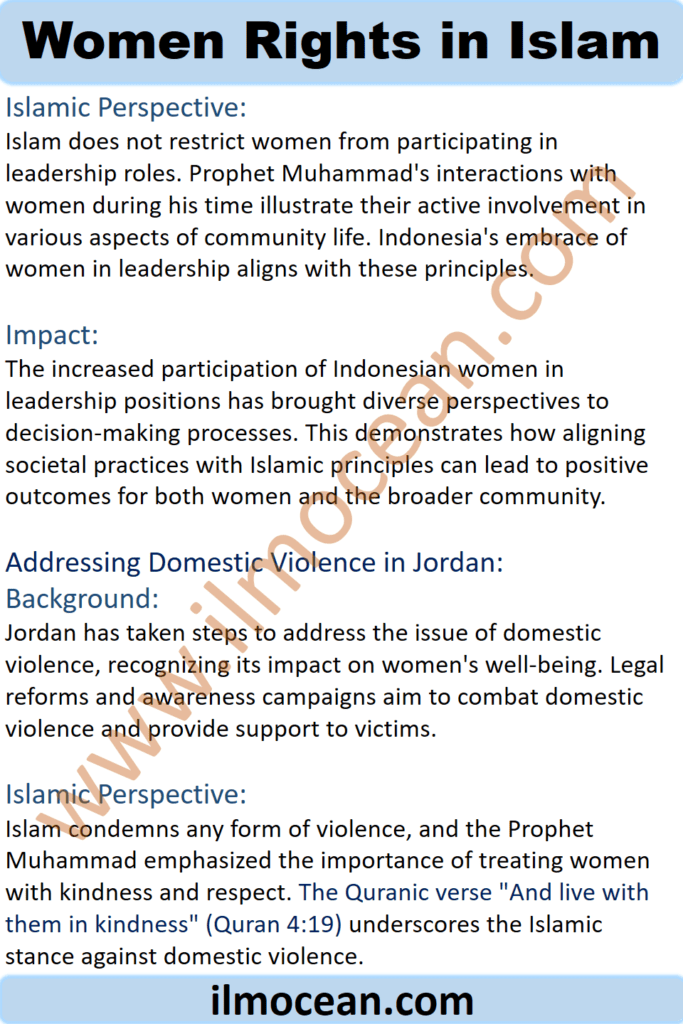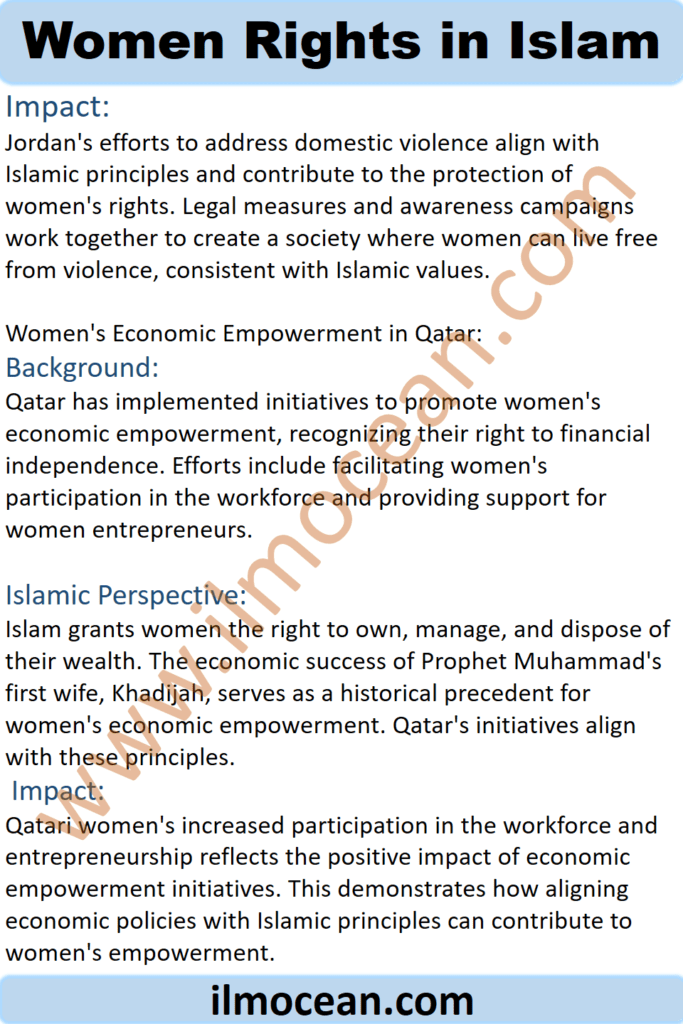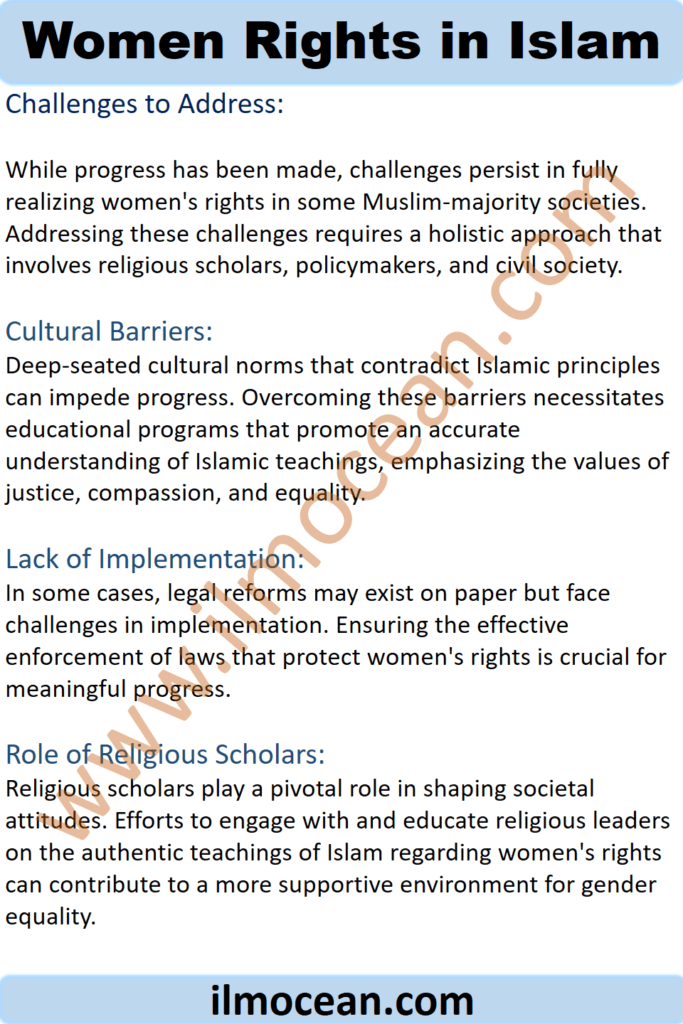-
Introduction:
Women’s rights in Islam is a multifaceted and often misunderstood topic that warrants careful examination. Islam, as a comprehensive religion, places a significant emphasis on the rights and status of women. While misconceptions persist, it is crucial to delve into the teachings of Islam to understand the true essence of women’s rights within the framework of the religion.
- Historical Perspective:
To comprehend the evolution of women’s rights in Islam, it is essential to explore the historical context. In the 7th century, when Islam emerged, Arabian society was entrenched in patriarchal norms. The advent of Islam brought transformative changes, advocating for the rights of women that were revolutionary for the time. The Quran, the holy book of Islam, contains verses that explicitly address women’s rights, challenging the prevailing societal norms.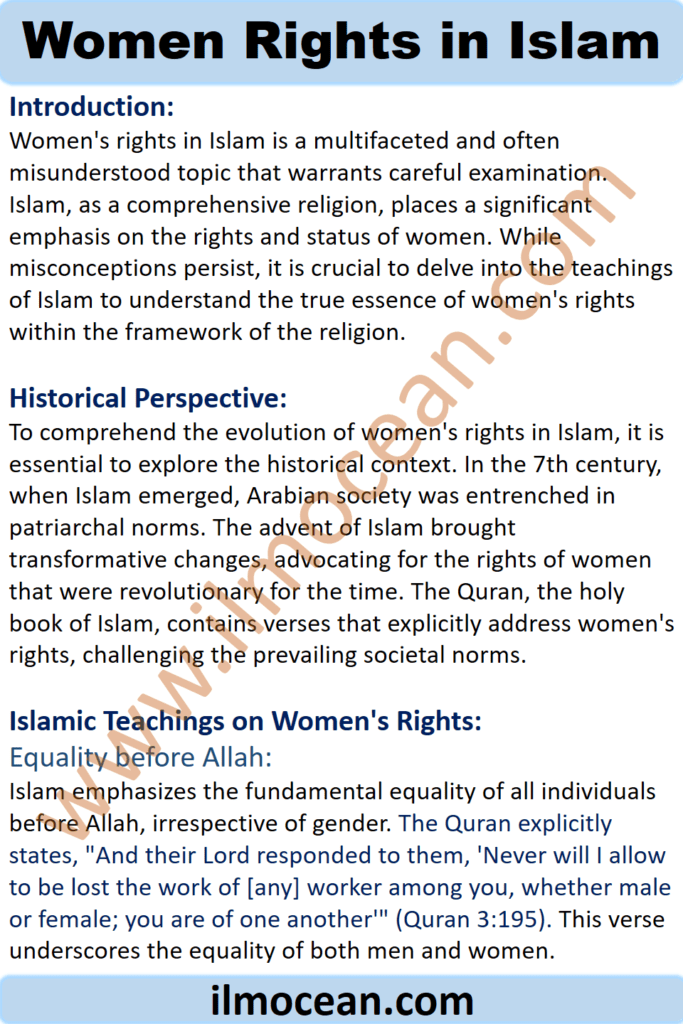
- Islamic Teachings on Women’s Rights:
- Equality before Allah:
Islam emphasizes the fundamental equality of all individuals before Allah, irrespective of gender. The Quran explicitly states, “And their Lord responded to them, ‘Never will I allow to be lost the work of [any] worker among you, whether male or female; you are of one another'” (Quran 3:195). This verse underscores the equal worth and spiritual significance of both men and women in the eyes of God.
- Education:
Islam encourages the diversion of knowledge for both men and women. Prophet Muhammad (peace be upon him) said, “Seeking knowledge is mandatory for every Muslim.” This inclusivity extends to women, emphasizing the importance of education and intellectual development.
- Right to Inheritance:
In pre-Islamic Arabia, women were often deprived of their rightful inheritance. Islam brought about a radical change by granting women the right to inherit from their parents and family members. The Quran explicitly outlines the distribution of inheritance, ensuring that women receive a fair share (Quran 4:7-11).
- Economic Independence:
Islam recognizes women’s right to financial independence. Women are entitled to own, manage, and dispose of their wealth without any interference. The Prophet Muhammad’s first wife, Khadijah, was a successful businesswoman, setting an early precedent for women’s economic empowerment in Islam.
- Marriage as a Partnership:
Islamic teachings emphasize the concept of marriage as a partnership based on mutual love, respect, and cooperation. The Quran advises, “They are clothing for you, and you are clothing for them” (Quran 2:187). This metaphor highlights the idea of mutual protection and support within the marital relationship.
- Challenges and Misconceptions:
Despite the clear emphasis on women’s rights in Islam, there are challenges and misconceptions that persist. Cultural practices in some societies, often influenced by patriarchal norms, may overshadow the true teachings of Islam. It is essential to distinguish between cultural practices and authentic Islamic principles to foster a more accurate understanding of women’s rights within an Islamic context.
- Cultural Practices vs. Islamic Principles:
Some cultural practices that restrict women’s rights have been wrongly attributed to Islam. Practices such as forced marriages, honor killings, or female genital mutilation are not rooted in Islamic teachings. These are cultural aberrations that contradict the principles of justice, equality, and compassion emphasized in Islam.
Misinterpretation of Quranic Verses:
Misinterpretation of Quranic verses, often taken out of context, can contribute to misconceptions about women’s rights in Islam. A comprehensive understanding requires considering the historical context, linguistic nuances, and the overall message of the Quran.
-
Contemporary Empowerment Efforts:
In contemporary times, efforts are underway within the Muslim world to promote and protect women’s rights, aligning with Islamic principles. Recognizing the importance of women’s empowerment, various Muslim-majority countries have implemented legal reforms to enhance gender equality.
- Legal Reforms:
Many Muslim-majority countries have undertaken legal reforms to align their legal systems with Islamic principles of justice and equality. Reforms related to marriage, divorce, and inheritance aim to ensure that women’s rights are upheld in accordance with Islamic teachings.
- Educational Initiatives:
Educational initiatives promoting women’s access to quality education have gained momentum. Empowering women through education is seen as a means to break the cycle of poverty, enhance societal development, and enable women to contribute meaningfully to their communities.
- Women in Leadership Roles:
The rise of women in leadership roles within Islamic communities is indicative of a positive shift. Women are increasingly participating in various fields, including politics, academia, business, and social activism, contributing to the overall progress of their societies.
- Contemporary Empowerment Efforts examples:
- Legal Reforms in Tunisia:
- Background:
Tunisia stands out as a pioneer in legal reforms aimed at enhancing women’s rights within an Islamic context. In 2017, the Tunisian government repealed a decades-old decree that prohibited Muslim women from marrying non-Muslims. This legal change was a significant step towards aligning national laws with the principles of justice and equality inherent in Islam.
- Islamic Perspective:
The Quran does not explicitly prohibit Muslim women from marrying non-Muslim men. The removal of this restriction in Tunisia aligns with the Quranic emphasis on freedom of choice in marriage and the absence of religious coercion (Quran 2:256).
- Impact:
This legal reform has empowered Tunisian women by granting them the right to choose their life partners based on personal compatibility rather than religious criteria. It demonstrates how legal changes can reflect Islamic values and contribute to gender equality within a Muslim-majority society.
- Women’s Education in Malaysia:
- Background:
In Malaysia, concerted efforts have been made to promote women’s education, recognizing the importance of intellectual development for both men and women. Educational initiatives aim to provide equal opportunities for women to pursue higher education, challenging traditional gender roles.
- Islamic Perspective:
Prophet Muhammad emphasized the pursuit of knowledge for all Muslims, irrespective of gender. The hadith “Seeking knowledge is mandatory for every Muslim” underscores the importance of education. Malaysia’s focus on women’s education aligns with this Islamic principle.
- Impact:
As a result of these initiatives, more Malaysian women are accessing higher education, entering fields traditionally dominated by men, and contributing to the country’s development. This demonstrates how Islamic principles can inspire policies that empower women through education.
- Women in Leadership in Indonesia:
- Background:
Indonesia, the world’s most populous Muslim-majority country, has seen a notable increase in women occupying leadership roles. Women are now serving as political leaders, academics, and professionals, breaking traditional stereotypes and contributing to the nation’s progress.
- Islamic Perspective:
Islam does not restrict women from participating in leadership roles. Prophet Muhammad’s interactions with women during his time illustrate their active involvement in various aspects of community life. Indonesia’s embrace of women in leadership aligns with these principles.
- Impact:
The increased participation of Indonesian women in leadership positions has brought diverse perspectives to decision-making processes. This demonstrates how aligning societal practices with Islamic principles can lead to positive outcomes for both women and the broader community.
- Addressing Domestic Violence in Jordan:
- Background:
Jordan has taken steps to address the issue of domestic violence, recognizing its impact on women’s well-being. Legal reforms and awareness campaigns aim to combat domestic violence and provide support to victims.
- Islamic Perspective:
Islam condemns any form of violence, and the Prophet Muhammad emphasized the importance of treating women with kindness and respect. The Quranic verse “And live with them in kindness” (Quran 4:19) underscores the Islamic stance against domestic violence.
- Impact:
Jordan’s efforts to address domestic violence align with Islamic principles and contribute to the protection of women’s rights. Legal measures and awareness campaigns work together to create a society where women can live free from violence, consistent with Islamic values.
- Women’s Economic Empowerment in Qatar:
- Background:
Qatar has implemented initiatives to promote women’s economic empowerment, recognizing their right to financial independence. Efforts include facilitating women’s participation in the workforce and providing support for women entrepreneurs.
- Islamic Perspective:
Islam grants women the right to own, manage, and dispose of their wealth. The economic success of Prophet Muhammad’s first wife, Khadijah, serves as a historical precedent for women’s economic empowerment. Qatar’s initiatives align with these principles.
- Impact:
Qatari women’s increased participation in the workforce and entrepreneurship reflects the positive impact of economic empowerment initiatives. This demonstrates how aligning economic policies with Islamic principles can contribute to women’s empowerment.
These examples illustrate how various Muslim-majority countries are aligning their practices with Islamic principles to promote women’s rights. By integrating the teachings of Islam into legal reforms, educational initiatives, leadership opportunities, efforts to combat violence, and economic policies, these countries are working towards creating societies where women can fully realize their rights and potential.
- Challenges to Address:
While progress has been made, challenges persist in fully realizing women’s rights in some Muslim-majority societies. Addressing these challenges requires a holistic approach that involves religious scholars, policymakers, and civil society.
- Cultural Barriers:
Deep-seated cultural norms that contradict Islamic principles can impede progress. Overcoming these barriers necessitates educational programs that promote an accurate understanding of Islamic teachings, emphasizing the values of justice, compassion, and equality.
Lack of Implementation:
In some cases, legal reforms may exist on paper but face challenges in implementation. Ensuring the effective enforcement of laws that protect women’s rights is crucial for meaningful progress.
Role of Religious Scholars:
Religious scholars play a pivotal role in shaping societal attitudes. Efforts to engage with and educate religious leaders on the authentic teachings of Islam regarding women’s rights can contribute to a more supportive environment for gender equality.
Conclusion:
In conclusion, women’s rights in Islam are deeply rooted in the teachings of the Quran and the practices of Prophet Muhammad. Islam promotes the fundamental equality of all individuals, regardless of gender, and grants women various rights, including the right to education, inheritance, and economic independence. However, challenges and misconceptions persist, often stemming from cultural practices or misinterpretations of Islamic teachings.
Efforts to promote women’s rights within the framework of Islam are underway, with legal reforms, educational initiatives, and the increasing participation of women in various fields. Addressing challenges requires a comprehensive approach involving religious scholars, policymakers, and civil society to foster a more accurate understanding of women’s rights in Islam and promote positive change within Muslim-majority societies. By aligning cultural practices with authentic Islamic principles, societies can create an environment that upholds the dignity, equality, and empowerment of women.
Download Women rights in islam PDF
